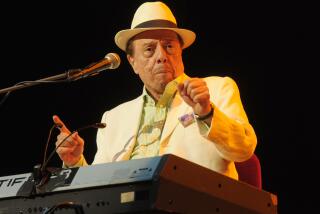JAZZ REVIEW : Nothing Beats the Rio Thing : Glen Garrett’s 20-member Brazilian samba big band enthusiastically delivers a variety of pleasing interpretations.
- Share via
HUNTINGTON BEACH — Glen Garrett’s 20-piece Brazilian samba big band, Feijoada Completa (Portuguese for “Black Bean Stew”), is a very special aggregation. Though the North Hollywood-based saxophonist/composer/arranger was born in Salt Lake City, the music he writes for his ensemble has Rio de Janeiro stamped all over it.
The fact that Garrett, who was working Wednesday as part of a six-night stint this week of Brazilian-based music at El Matador, has lived in Brazil undoubtedly enhances his interpretations. So does the leader’s performances with such noted Brazilians as Moacir Santos, Kleber Jorge, who was scheduled to appear at El Matador on Thursday, and Oscar Castro-Neves.
Garrett’s top-drawer crew enthusiastically played sambas, the traditional song form in 2/4 meter characterized by a flowing, buoyant rhythm and swaying melodies that ride on top. The band also delivered bossa novas, the subtler, more jazz-influenced form of samba, sometimes utilizing rock or funk beats.
The opening number, “Before It Is Too Late,” written by Ivan Lins, was typical of the mostly upbeat emphasis that Garrett’s orchestrations favored, resulting in a emotional boost for the attentive listeners. Television sets were on but, unlike some evenings at El Matador, were kept mute, and even the customers at the bar seemed engrossed by the proceedings.
“Before,” which has been recorded as “Notes From the Underground” by the Manhattan Transfer, began with a chorus of birdcalls and Portuguese whistles called apitos, played by Garrett and others. Next came a series of slow, plaintive statements by tenor man Ray Herman that exuded warmth.
Then, over a bossa/funk rhythmic surge provided by Michael Bruno on the surdo --a large silver drum on a harness--Ron Wagner on trap drums and Trey Henry on bass, the band played the tuneful melody.
Toninho Horta’s “Distant Horizons,” which has a 10-note melody that looks to the mind’s eye like cascading water splashing gently over some rocks, was an example of Garrett’s ingenuity at orchestrating. Like Ravel’s “Bolero,” there’s not a lot to this brief piece, so the leader expanded it by giving versions of the melody to various combinations: trombones, saxophones against a brass counter-melody, full ensemble with soprano saxophone and trumpet soloing simultaneously on top.
In between the written passages, the percussion section--Bruno, Kurt Rasmussen and Brian Kilgore--caught fire. So did soloists Dick Mitchell on tenor, who played everything from funk phrases to gushes so fast you couldn’t follow, and Jim Hirschman on guitar, who scored with chordal ideas and a clean, glowing sound.
The closing “Street Corner Samba,” reminiscent of the effervescence of the theme from “Black Orpheus,” was a fitting climax to this set of rewarding, invigorating sounds.
Emcee and bassist Luther Hughes was right on the money when he took the mike and said Garrett’s band should play the room again soon.
More to Read
The biggest entertainment stories
Get our big stories about Hollywood, film, television, music, arts, culture and more right in your inbox as soon as they publish.
You may occasionally receive promotional content from the Los Angeles Times.









